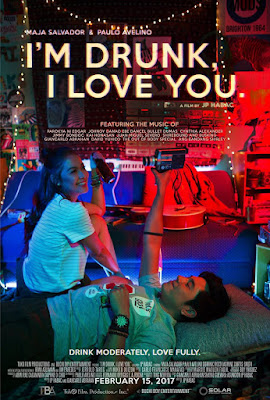DIE BEAUTIFUL (Jun Robles Lana, 2016)
"Die Beautiful" is a tale firmly rooted in contrasts and ironies. The narrative design itself, an examination of a trans woman's colorful life through the context of her unexpected death, lends to endless possibilities.
The film could not have been more timely, too, released in the midst of important LGBTQ milestones in Philippine history. In May, people elected the country's first openly transgender woman lawmaker, Bataan 1st District Representative Geraldine Roman. Just about two years earlier, Jennifer Laude, another trans woman was found dead in Olongapo City, an apparent victim of hate crime. Reporters and newscasters are stumbling whether to call her Jeffrey, or Jennifer. In a way, "Die Beautiful" mirrors both important events through the ups and downs of Trisha Echevarria's (Paolo Ballesteros) life.
Rody Vera's script follows a nonlinear narrative, starting off with Trisha's unexpected death and journeying back to important events that shaped her life. We follow Trisha, then Patrick to family and schoolmates, as a youngster in the midst of young love. We then see her, along with loyal best friend Barbs (Christian Bables), jump from one beauty contest to another, in pursuit of the elusive prized title. Then there's the adoption of a young orphan girl who later grows to be a woman, only to become a wayward daughter. There's also the men in Trisha's life, who both captured and broke her heart. The film doesn't tell all these in chronological order, because like hearing stories about the deceased in a wake, we get them at random. Yet, with Jun Lana's precise storytelling, we get the big picture in order of emotion. As the story progresses, more and more secrets unfold.
"Die Beautiful" feels like a two-hour grand tribute not only to Trisha, but to the LGBTQ struggle as well; bright colors are never in short supply, along with rapid one-liners, yet at the heart of the film is a warm and poignant emotional core. The film makes a subdued yet unflinching stand against discrimination and hate crime, that amidst all the laughter and the noise, viewers are urged to be more understanding of others.
Humor is one of the film's greatest canvas for analysis. Those who have seen Lana's previous film "Barber's Tales" will quickly realize that "Die Beautiful" is a reunion of sorts for several cast members. Iza Calzado plays herself, Sue Prado appears as a teacher and Eugene Domingo is a loud and proud couturier named MauMau Zalderiaga. Gladys Reyes gets bigger screen time, playing Trisha's sister.
Lou Veloso, who plays the owner of the funeral home where Trisha's wake is being held, is a riot. The jokes are always in perfect timing, and Veloso, a seasoned thespian, plays his character in full camp mode.
There are also references to Maricel Soriano movies, particularly to her famous scene with ZsaZsa Padilla in "Minsan Lang Kita Iibigin," with the added irony of Soriano's real-life sibling Mel Martinez herein playing Padilla's character.
Let's not forget Ballesteros' talent for makeup transformation, which really is one of the film's highlights. Appearing as Julia Roberts, Angelina Jolie and even Britney Spears, Ballesteros disappears into character, and it's not just for show. The makeup transformations are also integral for Trisha's metamorphosis, as well as the many faces she has to wear throughout her life.
Bables is a delight to watch as Barbs, complementing Ballesteros' charm and persona. Barbs is indeed a well-written and interesting character, breaking the stereotype that best friends are only there to tell us what we already know. Barbs, more than a friend, is family to Trisha. Barbs is Trisha's rock, unafraid to criticize her friend for often hastily made life choices.
I liked that the film did not bother to redeem Trisha's father, played by Joel Torre in the end. Remaining the strict, authoritarian patriarch even as his "son" is lying on a slab in the morgue, Torre maintains his character's pride and utter disgrace. Via the non resolution of his character, we are reminded that this film is more rooted in reality rather than fantasy, where parents rarely forgive their children for their sexual preferences and identifications, even in death.
"Die Beautiful" is an exceptional film, from the concept alone to Lana's brave filmmaking choices as a director. One particular scene in the film will be hard to turn away from, but perhaps it is Lana's way of confronting us with the gravity of his subject matter. I'd like to believe that Filipino audiences are ready for fresher and more inclusive storytelling like "Die Beautiful," given the warm audience reception it has received this Metro Manila Film Festival. Because, like in the movie, acceptance and respect begins with understanding.
RATING: 5/5


Comments
Post a Comment